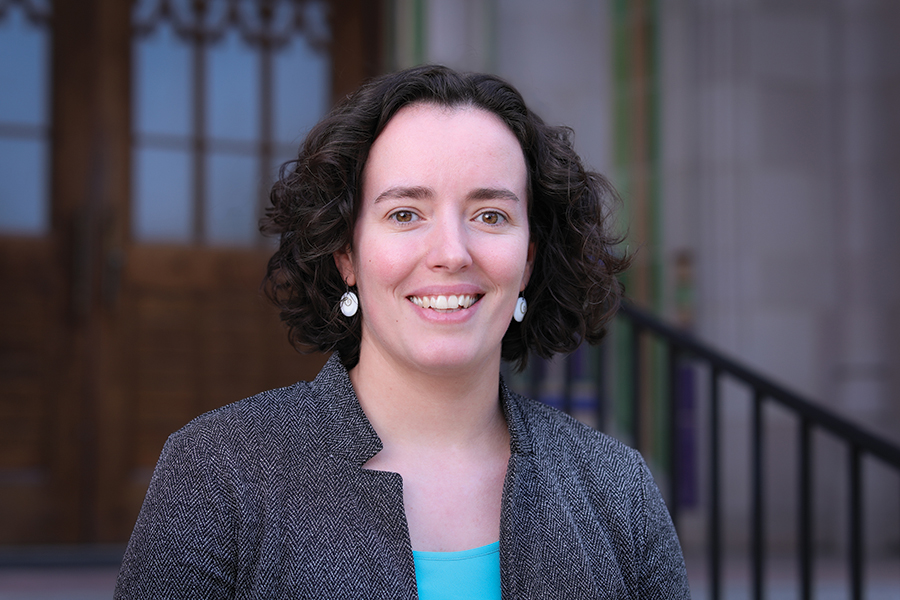Philosophical Fusion
Philosopher Zina Ward helps scientists understand the human and ethical considerations of their work

For thousands of years, philosophers, from Plato and Aristotle to Immanuel Kant and John Rawls, have pondered the ethical and social constructs that underpin human behavior and the societies people construct. Today, philosophers like Zina Ward are still helping us make sense of today's world in which some of the most pressing questions revolve around decidedly modern creations like artificial intelligence and big data.
Ward’s expertise is in the philosophy of science, which explores the foundations, methods and implications of science. As an assistant professor in Florida State University’s Department of Philosophy, Ward leverages philosophical theory to prepare students across disciplines to respond to present-day ethical situations.
For Ward, science plays a central role in daily life, whether in shaping individual decisions or contributing to privacy, economic, health care, education, trade or other policy. With its unique ability to help humanize thought processes of decisionmakers, philosophy of science is a key component to understanding and helping policy keep pace with the volume of data generated globally, which is projected to exceed 180 zettabytes, or 180 billion terabytes, by 2025.

“Philosophy and the sciences have a lot to offer each other,” Ward said. “Data science as a field is increasingly interested in ethical questions about autonomy, privacy, and fairness, and philosophers have been exploring these concepts for a long time. How should we understand autonomy? Why is privacy important? What does fair treatment require? There are quite literally centuries of philosophical thinking about these topics that are now relevant to data scientists.”
Ward, who obtained a doctorate in history and philosophy of science in 2020 from the University of Pittsburgh, joined FSU’s faculty just after graduating. She teaches courses on philosophy of science and applied ethics in the philosophy department as well as a required course on data ethics for students in the Interdisciplinary Data Science Master’s Degree Program.
Concepts touched on in the IDS program, including machine learning, AI and data collection, are relevant to both philosophers and the next generation of data science professionals.
“It’s especially interesting to hear from students in this class who have experience with privacy issues like workplace surveillance,” Ward said. “I learn a lot from those students. Their real-world experiences enrich the course for everyone.”
AI, far from being an objective source, is subject to inaccuracies and bias and holds risks for user privacy, as individuals’ data may be gathered, stored, and utilized without their knowledge or consent. Likewise, transparency and accountability regarding unethical data gathering practices may be lacking. In recent years, even the trustworthiness of photo, video, and audio have been called into question as deepfakes, digitally manipulated media that convincingly replace one person’s likeness with another’s, and other synthetic media have become a serious issue.
According to the Department of Homeland Security, threats posed by deepfakes and synthetic media don’t arise from technology used but rather from people’s natural inclination to believe things they see. Even unsophisticated fakes can spread misinformation.
From the earliest days of the program, Gordon Erlebacher, IDS program director and a professor in the Department of Scientific Computing, supported Dean Huckaba’s goal to include data ethics as a core part of the curriculum.
“Understanding usages of AI helps to increase responsible data usage and reduce the chance of inadvertent misuse,” Erlebacher said. “Zina ensures our students are well-informed in ethical considerations as they prepare to take their place in the workforce, and she challenges our students to think about pivotal data ethics issues.”
While philosophy isn’t typically considered a collaborative field, Ward eagerly embraces the cooperative undercurrents emerging in recent years, especially across disciplines. Three of her current projects are collaborations, and she’s also created Ethics, Data and Technology, a new course for philosophy undergraduates, to address cross-disciplinary interests in technology and philosophical thought. Ward also leads the interdisciplinary Philosophical Psychology Group, which organizes research presentations and discussions each semester.
“Zina has an impressive research record,” said Randolph Clarke, FSU philosophy chair. “To give just one highlight, her 2022 article, ‘Registration Pluralism and the Cartographic Approach to Data Aggregation across Brains,’ received the Popper Prize. Named for the eminent philosopher of science Karl Popper, the award recognizes the best article of the year in the British Journal for the Philosophy of Science, one of the most prestigious in philosophy. The selection is quite an honor.”
As society races to adopt the latest innovations, Ward’s philosophical preparation and collaboration can help decision-makers understand the human costs of choices surrounding technological and scientific advancements.
“A general ambition for my work in philosophy of science is to be relevant to practicing scientists, including data scientists,” Ward said. “Philosophy of science helps us ensure our science is ethically sound, methodologically robust and interpreted properly. I’m proud my research is a small part of that.”
Dena Reddick is an FSU alumna who earned master's degree in history in May 2020.
